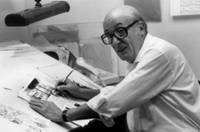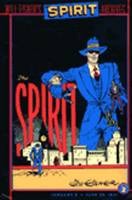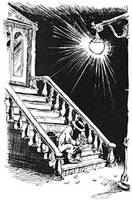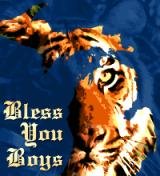"You can’t die if you single-handedly invented the language of an entire art form and the concept of the graphic novel. It's impossible. He is immortal."
-- Brian Michael Bendis, on Will Eisner. from willeisner.com
from willeisner.com
Early Tuesday evening, I read the news of comic book artist Will Eisner's death on Brian Michael Bendis's message board. He died yesterday at the age of 87 from complications following quadruple heart bypass surgery. (If you're interested, here's a discussion thread where comics creators and fans alike are paying tribute. He influenced and touched a lot of people.) Eisner was a legend in the comic book world who pioneered the concept of the "graphic novel," a stand-alone story or short stories collected in a book format. 1978's "A Contract with God" is often credited as the first graphic novel.
I always kept an eye on the graphic novel section while working at Barnes & Noble (someone had to), and bought as many of Eisner's books ("The Dreamer," "The Building," "Dropsie Avenue," and "Invisible People") as I could with my employee discount. Many of his books depicted slice-of-life stories that touched on social issues like immigration, poverty, racism, and gentrification. Quoted in Adam Bernstein's outstanding obituary in the Washington Post, Eisner said, "I'm dealing with the human condition, and I'm dealing with life. For me, the enemy is life, and people's struggle to prevail is essentially the theme that runs through all my books."
He also adapted several classic stories such as "Oliver Twist" and "Moby Dick." (It's really an amazingly diverse body of work; you can check it out at Eisner's website.) In addition to his novels, Eisner also wrote several instructional books about the craft of drawing comic books, including "Comics & Sequential Art," which a young Ian Casselberry often consulted in the days he dreamed of becoming a comic book artist. It's still sitting by my old drawing table in my parents' basement.
But Eisner might be best known for "The Spirit," the comic strip he wrote and drew from 1940 to 1952. Eisner was asked by his syndicate to create a masked hero to compete with the likes of Batman, but he could never quite embrace the superhero concept. His character, Denny Colt, wore a mask but was a normal guy with no superpowers, a detective who often used nothing more than his fists to get him out of trouble. He also seemed to have varying degrees of success with a collection of femme fatales. (I'd love to have that old employee discount back, so I could buy all the Spirit Archives books that DC Comics has published.)
(In "The Incredibles," director Brad Bird paid tribute to The Spirit in one scene by dressing Mr. Incredible in a blue suit and red tie. He also acknowledged this inspiration in his first film, "The Iron Giant," when his main character brings out a Spirit comic book for the giant robot to read. I'd include a link that could prove this to you, but the only one I can find is from Entertainment Weekly, and the site requires a subscription. Drat.)
Eisner knew that the comic book art form was capable of so much more than the escapist fantasies it typically portrayed, and devoted his career to showing comic books were a viable, valid storytelling venue. As he once said, "I've been trying to prove what the medium can do my whole life." It's truly fitting that perhaps the most distinguished award in the comic book industry is named after Eisner and handed out each year at the San Diego Comic-Con.
Here's one more tribute to Eisner, by cartoonist Neil Kleid. It captures the range and impact of Eisner's influence quite well.
And another obituary, from Sarah Boxer in the New York Times. from "A Contract with God"
from "A Contract with God"
Wednesday, January 05, 2005
Will Eisner, 1917-2005
Posted by
Ian C.
at
3:08 AM
![]()
Labels: comic books, Will Eisner
Subscribe to:













